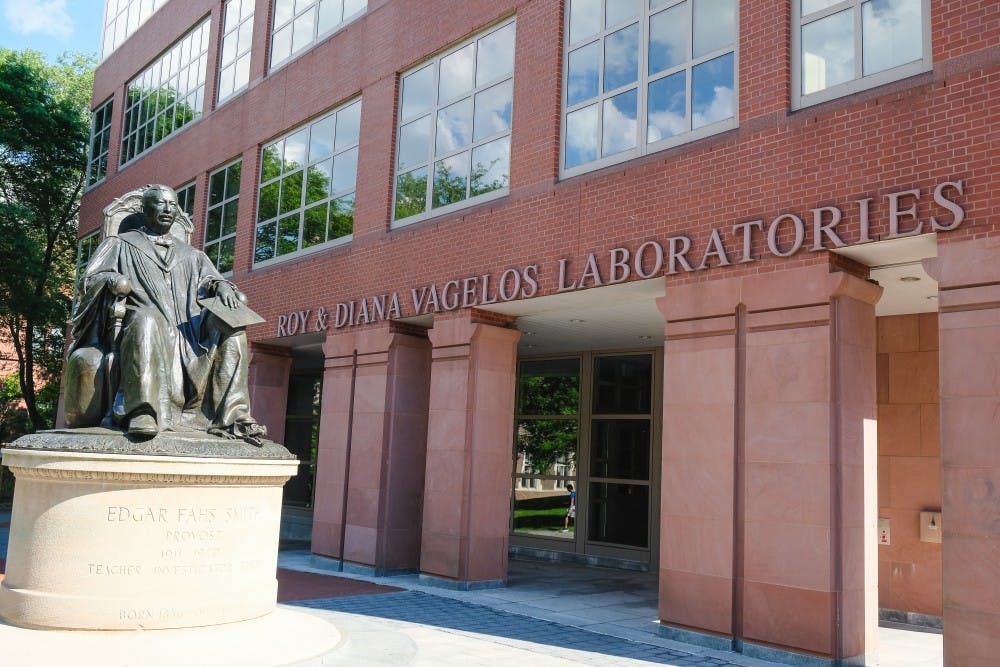
Five students will receive free tuition for the remainder of their time at Penn after winning the Vagelos Challenge Award. The award recognizes students who have excelled in advanced science coursework and who are submatriculating into chemistry or physics graduate groups.

Since its inception in 2005, the award's purpose has been “to reward the very best, motivated and advanced science students, and challenge them to get the most from themselves and Penn", according its web page.
Candidates must have a science and mathematics GPA in the top 25 percentile of College students and must have completed about 70 percent of the required coursework for the physics, chemistry, biophysics or biochemistry majors. Winners, typically rising juniors or seniors, receive a full tuition scholarship for the rest of their undergraduate years regardless of financial need.
This year’s Vagelos Challenge Award winners, who were announced this past Thursday, include rising College seniors Marcello Chang, Ali Ghorashi, Megan Gumina, and Matthew Osborn, as well as rising College junior Srinivas Mandyam, who is also an Under the Button staff member.

Winners are selected by an Award Committee consisting of the Undergraduate Chairs of Physics, Chemistry, Biochemistry and Biophysics and the Graduate Group chairs of Physics and Chemistry.
“We sort of are looking for people we think are going to become scientists in the ‘discovery’ business, as opposed to scientists in the ‘supervising other scientists’ business,” Biochemistry Chair Ponzy Lu said.
He added that winners typically distinguish themselves in advanced courses and laboratory research.

There is no formal application process for the award—all students who submatriculate into chemistry or physics graduate groups are automatically considered. Lu said that this serves to reduce competitiveness surrounding the award.
“Our way of trying to tamp [competitiveness] down is to not have an application process,” he added.
Students said that they found out about the award at different points during their undergraduate careers and that it was not a source of stress.
Gumina said that she heard about the award before coming to Penn but that it wasn’t “present on [her] mind” until the end of her sophomore year. Even after that, she said that she did not actively work towards the award and did not feel that it created competition.
“I never pursued the award in any way,” Gumina said, adding that she hadn’t encountered others actively seeking the award either. “I don’t think that we understand how people are selected for the most part, so I think that I haven’t really felt a lot of competition surrounding this award.”

Gumina also said that she has not found upper-level sciences classes to be overly cutthroat.
“I would say that I think that a lot of the classic pre-med classes like Orgo and Intro Biochem have a lot more of a competitive feel compared to classes that lead to this type of award,” she said.
Similarly, Osborn said that the award has not made his Penn experience “more or less competitive.”
Osborn said that he first heard about the award as a freshman when that year’s winners were announced.
“Obviously it stuck in my head. It seemed like a pretty big deal,” he said.
However, he added that he thinks that people take advanced classes “to become a better scientist” and “to look better for graduate school or med school admissions,” not because they want to win an award.
Ghorashi, who is a physics major, said that he did not hear about the Challenge Award until two weeks before he won it, when his advisor asked him if he planned on submatriculating.

“It’s called the Vagelos Challenge Award, so I always assumed that it was for people in the Vagelos program,” Ghorashi said. “So I just kind of did my own thing and I guess my own interests kind of led to it naturally, so I didn’t have to stress out too much about it.”
Last school year, all sophomores in the Vagelos Molecular Life Sciences program were advised by email in September that biochemistry majors must complete the second semester of physical chemistry by May 2018 if they wanted to be considered for the Challenge Award.
Ghorashi added that he appreciates how the award pushes students to challenge themselves in the sciences.
“I really support the program,” Ghorashi said. “I think it really incentivizes people to do their best and pursue careers in science.”
The students stressed that people should take classes that they are interested in rather than trying to pursue awards.
“If people are reading this article and trying to think of ways to win an award like this, I would advise against doing that,” Gumina said. “I think that it’s a much better use of your time at Penn to just take classes that you’re interested in and think of ways that you can challenge yourself versus competing with others.”
The Daily Pennsylvanian is an independent, student-run newspaper. Please consider making a donation to support the coverage that shapes the University. Your generosity ensures a future of strong journalism at Penn.
Donate




